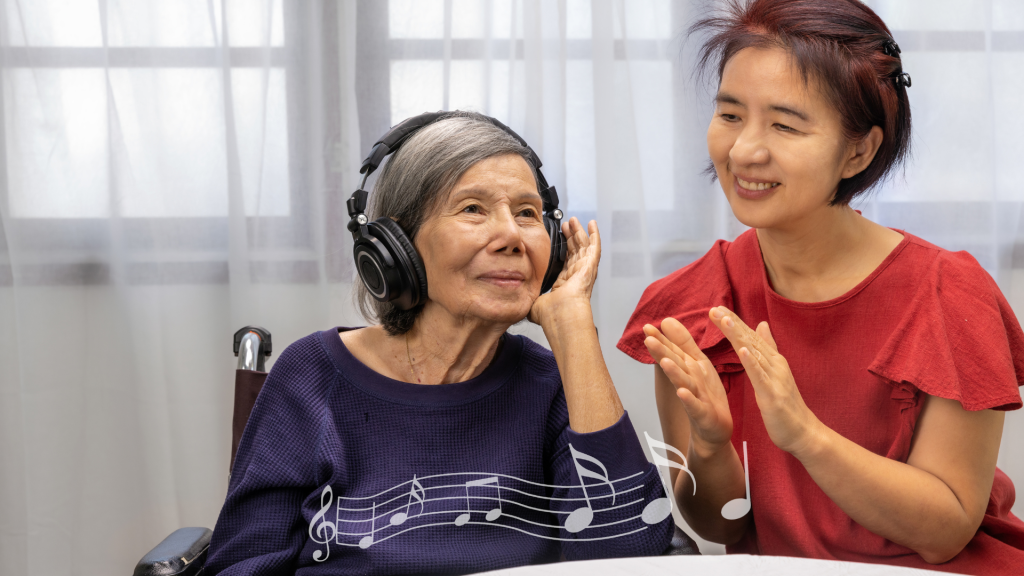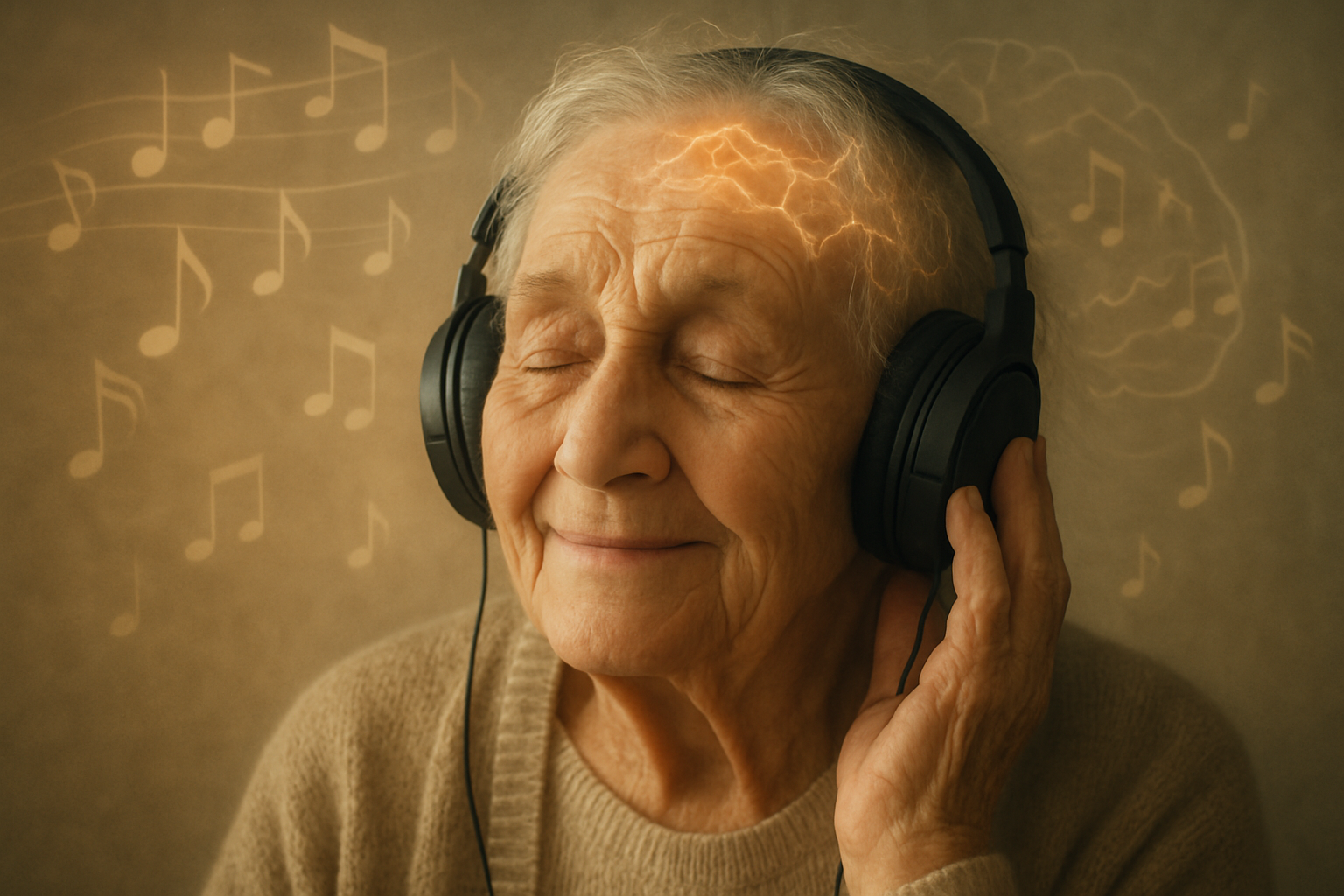Introduction
Dementia doesn’t just erase memories — it slowly erodes a person’s connection to the world, to loved ones, and to themselves. But here’s the twist most people don’t realize: music can cut through the fog. It can awaken parts of the brain that even advanced dementia often spares. In a world where pharmaceuticals often fall short or come with trade-offs, music offers a non-invasive, emotionally resonant, scientifically-backed lifeline.
Let’s explore how and why it works.
1. Music and the Brain: The Neuroanatomy of Sound and Emotion
The human brain is wired for music. Long before we understand language, we respond to rhythm and melody. Music activates a broad neural network, including:
- Auditory cortex (temporal lobe): processes sound.
- Hippocampus: involved in memory formation.
- Amygdala: emotional processing.
- Motor cortex: rhythm often triggers movement or tapping.
- Prefrontal cortex: supports attention, judgment, and planning.
Even in advanced dementia (including Alzheimer’s), where language, reasoning, and memory may be heavily impaired, musical memory and emotional recall often remain intact — because these processes are less dependent on the hippocampus and more on diffuse networks that degrade more slowly.
2. What the Research Says: Evidence-Based Effects of Music on Dementia
➤ Reduced Agitation and Aggression
Music therapy has been shown to significantly reduce behavioral and psychological symptoms of dementia (BPSD), including aggression, anxiety, and wandering.
- A 2020 Cochrane Review found personalized music interventions led to reduced agitation in people with moderate to severe dementia.
- A randomized controlled trial in Aging & Mental Health (2018) revealed that daily music therapy sessions for 6 weeks reduced aggressive behaviors by up to 60% compared to control groups.
➤ Improved Mood and Depression
Depression is common in dementia, and music has shown positive effects here too. One meta-analysis published in Dementia and Geriatric Cognitive Disorders (2017) showed:
- Mood improvement in 70% of patients after consistent exposure to music they enjoyed.
- Benefits were strongest when music was familiar and personally meaningful.
➤ Enhanced Memory and Cognition
Music doesn’t just soothe — it can spark memories. In fact, it’s one of the few tools that can access autobiographical memory in dementia patients.
- A study in Brain (2015) using fMRI scans found that the medial prefrontal cortex — a region associated with musical memory — remains relatively preserved even in Alzheimer’s patients.
- Music paired with images or names can improve facial recognition and recall for people with mid-stage dementia.
Special: Unlock the Secret to Supporting Brain Health: Rejuvenate Your Memory. More HERE
3. The Power of Personalized Playlists: Not Just Any Music
Not all music is created equal. The strongest therapeutic effect comes from music that holds personal emotional significance — the soundtrack of one’s life. Whether it’s an old love song, a hymn, or a jazz tune from their youth, this triggers autobiographical memory and emotional engagement.
- The “Music & Memory” program popularized this approach by giving dementia patients iPods loaded with personally curated playlists. The results? Stunning emotional awakenings, documented in the film Alive Inside.

4. Mechanisms Behind the Magic: Why Music Works
Let’s get nerdy for a second.
🎵 Music activates the dopaminergic reward system.
Just like food, sex, or social interaction, pleasurable music floods the brain with dopamine, lifting mood and increasing alertness.
🧠 Entrains neural oscillations (brain waves).
Music with steady rhythm can entrain alpha and theta brain waves, helping reduce anxiety and support calm focus.
🗣️ Stimulates language pathways through melody.
In patients with dementia who lose the ability to speak fluently, melodic intonation therapy (singing phrases) has helped revive verbal communication.
5. Practical Applications: How to Use Music in Dementia Care
Want to integrate music into dementia care? Here’s how to do it right:
- Create personalized playlists from the person’s youth (age 15–30 is the sweet spot).
- Use headphones for immersive experience — but monitor for overstimulation.
- Pair music with pictures or family videos to enhance memory retrieval.
- Use music during stressful activities like bathing, dressing, or mealtimes to reduce resistance.
- Schedule music at the same time daily to anchor routines and reduce confusion.
6. Caution: Not Always a Cure-All
Let’s be honest — music isn’t a miracle for every patient. Some individuals may:
- React poorly to certain genres (e.g., fast-paced or chaotic music).
- Experience overstimulation or confusion.
- Have auditory processing disorders in later-stage dementia.
That’s why observation and personalization are critical.
Conclusion: Music as Medicine, No Prescription Required
When words fail and memories fade, music often remains. It doesn’t just entertain — it restores dignity, soothes the soul, and reconnects the person to their humanity. As research continues to confirm what caregivers have long known intuitively, music stands out as one of the most powerful, low-cost interventions for emotional and behavioral care in dementia.
It may not reverse the disease, but it absolutely transforms the experience of living with it.
Special: Unlock the Secret to Supporting Brain Health: Rejuvenate Your Memory. More HERE
References
- van der Steen, J. T., et al. (2018). Music-based therapeutic interventions for people with dementia. Cochrane Database of Systematic Reviews.
- Särkämö, T., et al. (2014). Cognitive, emotional, and social benefits of regular musical activities in early dementia: randomized controlled study. The Gerontologist.
- King, J. B., et al. (2019). Music memory and hippocampus connectivity in Alzheimer’s disease. Brain Sciences.
- Gerdner, L. A. (2000). Effects of individualized music on confused and agitated elderly patients. American Journal of Alzheimer’s Disease and Other Dementias.
- Altenmüller, E., & Schlaug, G. (2015). Apollo’s gift: new aspects of neurologic music therapy. Progress in Brain Research.
- Alive Inside. (2014). Directed by Michael Rossato-Bennett. Documentary Film.
